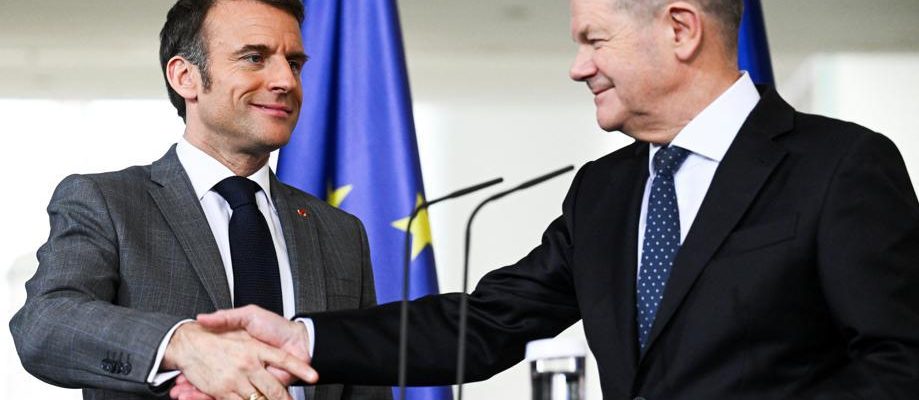DECRYPTION – In the presence of Polish Prime Minister Donald Tusk, the head of state and the German chancellor demonstrated their “unwavering” support for Ukraine.
Correspondent in Berlin
A third man to relieve the tension of a face-to-face meeting: this is how the staging of Franco-German reconciliation took place on Friday in Berlin, involving a third actor in the person of the Polish Prime Minister, Donald Tusk, alongside Olaf Scholz and Emmanuel Macron. It was at the end of a tripartite meeting – contrary to initial protocol announcements – that the German, French and Polish leaders appeared before the press to display, in front of Vladimir Putin, “a sign of determination to help Ukraine, whatever the cost”, in the words of the chancellor, host of the meeting. “We are unwaveringly at his side”insisted the latter while condemning “ the Russian imperialist aggressor “.
Beyond the symbols, such as the delivery of military honors rendered jointly to the two guests, the three men agreed to set up a coalition of allies for the delivery to kyiv of “long-range weapons”, the format of which would be non-binding. In recent days, conversely, Olaf Scholz had reiterated his refusal to deliver Taurus missiles with a radius of 500 kilometers. This veto has become a focal point of German policy and is causing unease within the government itself. The initiative for such a coalition should be discussed early next week by Western defense ministers who will meet at the American air base of Ramstein, in western Germany.
Read alsoGermany is panicked by the disunity of the Macron-Scholz couple over the conflict in Ukraine
On this subject, the idea of an indirect delivery of German Taurus, held by third countries, has already been supported by the head of German diplomacy, Annalena Baerbock. This would make it possible to not directly involve Berlin in the transaction. “We will never take the initiative to escalate”tried to reassure Emmanuel Macron, before mentioning this “new capability coalition intended to strike in depth”. This reservation can be seen as a gesture of reciprocity addressed to Olaf Scholz, who fears precisely inflaming the conflict by sending Taurus. Furthermore, purchases of ammunition in third countries should accelerate at the initiative of the allies, declared the three men. Finally, support for Moldova, a country bordering Ukraine and the Odessa region, will be “reinforced”.
Electoral ulterior motives
Within the Franco-German couple, which sought to correct the image of recent weeks, the presence of the new Polish Prime Minister, Donald Tusk, resolutely pro-Western, was supposed to inject a little oil into a stalled engine. Olaf Scholz had sharply rejected the hypothesis formulated by Emmanuel Macron to send troops to Ukraine, which did not prevent the latter from driving the point home, warning Germany against the risk of ” weakness ” or “cowardice”. “Prudence should not be called weakness, as some do”, the German Chancellor defended himself on Wednesday in the Bundestag. During the same debate, his number one ally, the leader of the SPD fraction in the Lower House, Rolf Mützenich, called on the government to “freeze the conflict rather than lead it”.
We agree with the approach (French, Editor’s note), according to which it is we who must control the escalation process and not Putin
Radoslaw Sikorski, head of Polish diplomacy
In their respective capitals, the two heads of state are suspected, even accused, of ulterior electoral motives: the “war leader” Emmanuel Macron of wanting to counter the RN in the European elections; the “pacifist chancellor” Olaf Scholz to seek to rally the support of voters in the former GDR before crucial elections next September, dominated by the pro-Russian far right (AfD). On paper, Friday’s meeting was a two-for-one: against Berlin’s advice, Warsaw sided with Paris’ view that sending soldiers to Ukraine could not be ruled out. “We agree with the approach (French, Editor’s note), that it is we who must control the process of escalation and not Putin”said in an interview with the daily Gazeta Wyborcza the head of Polish diplomacy, Radoslaw Sikorski.
“Finally, Paris and Berlin are each doing what they can”
For his part, the Polish ambassador in Berlin also called on Olaf Scholz to ” demonstrate courage ” by delivering long-range Taurus missiles. “In this triangle between the three capitals, Germany risks finding itself alone, and this is a major risk that, if necessary, Olaf Scholz will have to assume in front of public opinion. And our country should show more flexibility towards its two partners,” observes Martin Koopmann, director of the German Genshagen Foundation, a think tank focused on the so-called “Weimar Triangle”. For his part, Donald Tusk, who returned from Washington, reaffirmed the strategic importance played by the transatlantic ally in European security, thereby espousing the German position.
Read alsoOlaf Scholz, the “chancellor of peace” who exasperates Emmanuel Macron
“If you make us choose between France and the United States, we will always choose the United States,” Polish Foreign Minister Radoslaw Sikorski also recalled. The Polish Prime Minister has invited his counterparts next summer but it nevertheless seems that his presence alone will be insufficient to revive the couple.“Tusk understood very well that these Franco-German relations remain the sine qua non condition for moving forward,” adds Martin Koopmann, for whom the priority is first and foremost to display a better image.“Ultimately, Paris and Berlin are each doing what they can. And in the absence of changing the situation in the short term, the important thing is, in the face of Putin and European public opinion, to communicate better, and this in a complementary way. »

